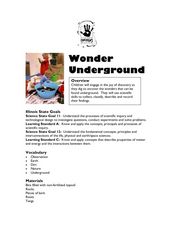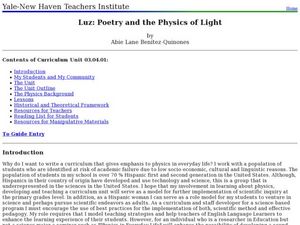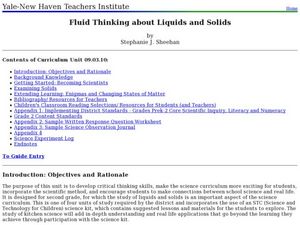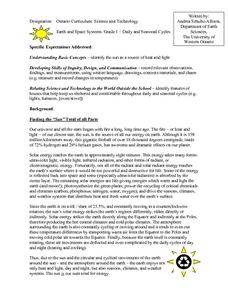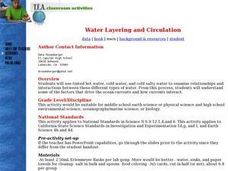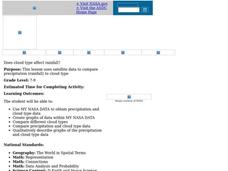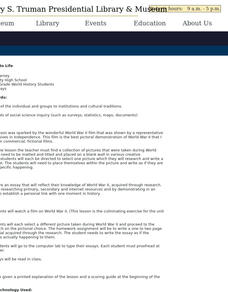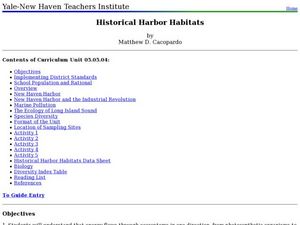Curated OER
Oil Crisis: Get Into the Game
Students participate in activities to develop an understanding of the world oil crisis. In this oil crisis activity, students read online articles about the oil shortage. They attempt to develop a solution to problem and to take action....
Curated OER
Invent on the Spot
The best inventions come from a problem that needs to be solved! Given a container with holes in it, learners must solve how to stop liquid from pouring out. They work together to develop an invention to accomplish this task.
Curated OER
Wonder Underground
Students classify and record objects they find "underground." In this observation lesson, students dig into bins filled with soil and encounter various objects such as bark, twigs, etc. Students classify their findings.
Curated OER
Hide In Plain Sight
Students view video clips and use the Internet to look for hidden animals. They then use the Internet to print out animal shapes and color them. They create environments on construction paper in which their animals can hide.
Curated OER
The Effects of Temperature Variations on the Heartbeat Rate of Daphnia
Young scholars use DigiScope technology to investigate Daphinia, popularly known as water fleas. They design, conduct, and report on an experiment to determine the effects of varying water temperatures on the heartbeat rate of Daphnia.
Curated OER
Luz: Poetry and the Physics of Light
Students explore color, light, refraction and reflection. In this light activity students measure solar position and compare it to time.
Curated OER
Fluid Thinking About Liquids and Solids
Second graders examine the physical characteristics of the different states of matter. For this chemistry lesson, 2nd graders observe how matter changes from one phase to another. They classify substances according to its type of matter.
Curated OER
An Introduction to Sensors
Students research the International System (SI) of units of measurements. They make measurements using the metric system. They study key concepts used in building and use of sensors, how sensors work and their role in measuring...
Curated OER
Ecological Succession in Pond Water Cultures
Students collect samples of pond water, dried grass, and soil in a jar. They predict the order of ecological succession in their pond water cultures. They compare their expected results with their observed results.
Curated OER
The World's Forests
Students examine the world's forests. In this forest lesson, students gain knowledge about the sustainability of forests. Students break into groups and brainstorm why forests are so important to our world. Students discuss what can be...
Curated OER
Rocks, Minerals, and Erosion
Fourth graders describe the difference between minerals (composed of the same substance throughout) and rocks (composed of two or more minerals). They recognize that there are three classes of rocks: igneous, sedimentary, and metamorphic
Curated OER
Daily and Seasonal Cycles
First graders identify the sun as a source of heat and light. They identify features of houses that help keep use sheltered and comfortable throughout daily and seasonal cycles. Students are told that summer is the best season to...
Curated OER
Needs of Living Things
Students discuss and explore the needs of living things. They choose to create a slide show with captions, create a web showing the needs of one Organism using KidPix. or make picture book by hand or using Microsoft Publisher.
Curated OER
Ocean Grazers: Class Field Trip
Students explore biology by participating in a field trip. In this oceanography lesson, students define the survival characteristics of bottom dwelling creatures also known as ocean grazers. Students attend a class field trip to a beach...
Curated OER
Water Layering and Circulation
Students examine relationships and interactions between different types of water. They experiment with colored water of different temperature and salinity and discuss how the results relate to real ocean currents.
Curated OER
Does Cloud Type Affect Rainfall?
Student uses MY NASA DATA to obtain precipitation and cloud type data. They create graphs of data within MY NASA DATA. They compare different cloud types as well as precipitation types. They describe graphs of the precipitation and cloud...
Curated OER
Death On Board La Belle: Finding Clues from Old Bones
Students practice analyzing skeletal remains for clues by using the Internet. In this scientific investigation lesson, students research the La Belle shipwreck using the Internet and written materials, later completing a Skeletal Report...
Curated OER
Legends Coming to Life
Students prepare an essay that reflect their knowledge of World War II, acquired through research.
Curated OER
Get Your Motor Runnin'
Students examine the technology of hybrid vehicles and the claims made on their behalf. Upon further exploration, they research and decide which cars, hybrid or non-hybrid, might perform best under various circumstances.
Curated OER
Radioactivity Experiments
Students study the difference between types of ionizing radiation and how elements are transmuted. They determine that radiation is normal and surrounds us. They calculate the amounts of alpha, beta and gamma radiation emitted from a...
Curated OER
Disease & Epidemics: Architects of History
Students explore disease and its relationship to history and literature. They investigate issues that range from early biological warfare and historical disease treatments, to observing today's race for the cure against current emerging...
Curated OER
Historical Harbor Habitats
Tenth graders create food web displays in the classroom. In this ecology lesson, 10th graders identify the different pollutants in the environment and their effect on organisms. They collect samples of sediments from the harbor and...
Curated OER
The Pickle "Dill"emma
High schoolers study a problem in their local farming community regarding a pickle factory, and the class is asked to help determine if the pickle factory is the source of a seed germination problem.
Curated OER
Understanding How Potatoes Grow
Second graders make a KWL chart and brainstorm what they need for the project of growing potatoes. They choose one potato and plant it in water or peat moss cups and choose a location in which meets the needs of the plants and make their...
Other popular searches
- Life Science Inquiry Fossils
- Life Science Inquiry Frogs
- Life Science Inquiry Lessons
- Life Science Inquiry Labs
- Life Science Inquiry Mammals
- Life Science Inquiry Chicken
- Inquiry Based Life Science




